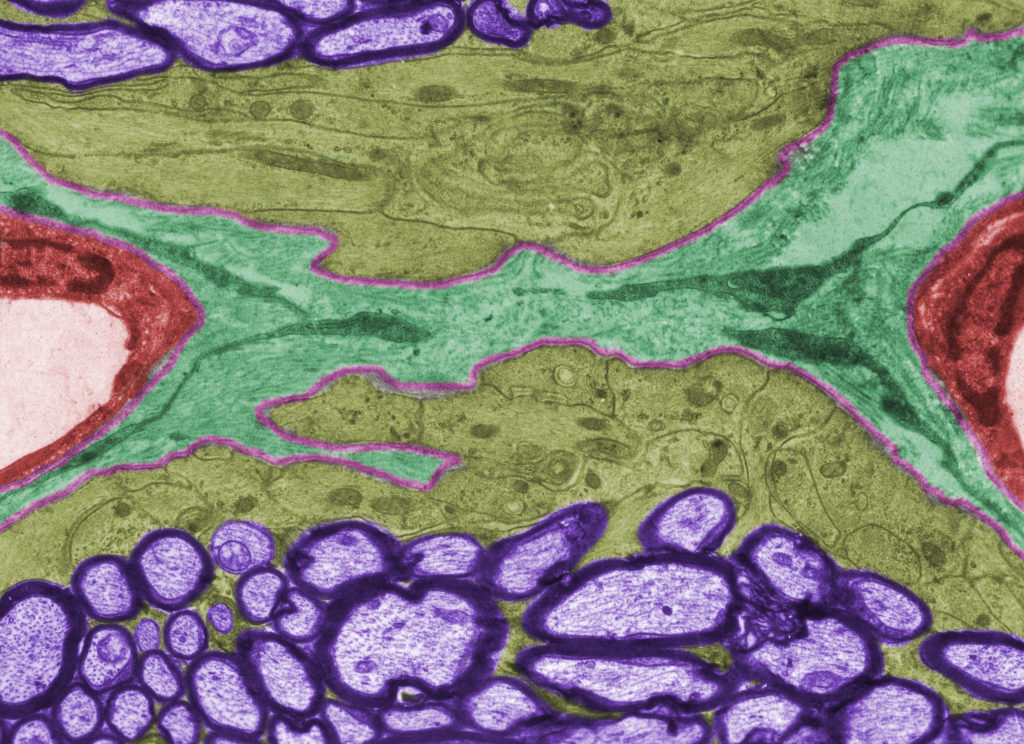Quick Hits
Daily brief research updates from the cognitive sciences

This sounds pretty gruesome – your brain starting to eat itself, like some sort of disease in a horror film. However, research recently published has shown that this process, which we have known about for a long time, is important in developing memory in the short term.
But let’s understand how the brain can eat itself in the first place. There are a number of ways the brain, or rather specific cells in the brain and most of these are good for the brain, digest parts. Firstly, we know that as the brain develops in early childhood there is a key phase of so-called pruning. This is when the brain, or specifically a form of helping cell in the brain called glial cells, cut back connections in the brain. This helps make our brains more efficient and stabilises certain memories and functions.
There are also other processes, and these are often part of everyday cleaning processes whereby a type of glial cell will clear out toxins collected in the brain – and then there is a process whereby damaged cells are cleared out. If the brain does this overenthusiastically, for example after stroke, this can inhibit brain functions.
This we know, but we didn’t know how this works in a day-to-day basis and how this helps plasticity, our brain to develop and learn new things, and therefore memory.
This is where Yosuke M. Morizawa and colleagues at Tohoku University in Japan managed to discover more. They focused on what are called Bergmann Glial Cells and managed to image these as they were “nibbling” on synapses, connections, between neurons.
What was interesting is that when the researchers managed to genetically inhibit this process the learning in mice was blocked. This therefore shows that those cells, by eating away at our brain connections after a learning process, enhance learning.
Therefore, this eating away at our synapses, likely clears out toxins but also improves efficiency of processing and therefore helps us learn more.
So, there you have it your brain eats itself to stay more efficient – but only in a small way, thankfully.

Andy Habermacher
Andy is author of leading brains Review, Neuroleadership, and multiple other books. He has been intensively involved in writing and research into neuroleadership and is considered one of Europe’s leading experts. He is also a well-known public speaker, speaking on the brain and human behaviour.
Andy is also a masters athlete (middle distance running) and competes regularly at international competitions (and holds a few national records in his age category).
References
Yosuke M. Morizawa, Mami Matsumoto, Yuka Nakashima, Narumi Endo, Tomomi Aida, Hiroshi Ishikane, Kaoru Beppu, Satoru Moritoh, Hitoshi Inada, Noriko Osumi, Eiji Shigetomi, Schuichi Koizumi, Guang Yang, Hirokazu Hirai, Kohichi Tanaka, Kenji F. Tanaka, Nobuhiko Ohno, Yugo Fukazawa, Ko Matsui.
Synaptic pruning through glial synapse engulfment upon motor learning.
Nature Neuroscience, 2022
DOI: 10.1038/s41593-022-01184-5
More Quick Hits
Groovy Music Improves Brain Performance
Quick HitsDaily brief research updates from the cognitive sciences et into the groove… or so sang Madonna with her hit single in 1985. Little did she know at the time but getting into the groove certainly does seem to be beneficial for you - not to...
Even Moderate Alcohol Consumption Linked to Brain Decline
Quick HitsDaily brief research updates from the cognitive sciences he tide seems to have turned on alcohol. Though we have always known that excessive alcohol consumption is negative there were for a long time inconsistencies with the research into...
Flu Vaccination Dramatically Lowers Risk Of Alzheimer’s
Quick HitsDaily brief research updates from the cognitive sciences am always interested in headlines that are related to brain health. And though Alzheimer’s is a long way off for (hopefully) me, this still struck me as interesting. For me this...
How Mindfulness Meditation Reduces Pain
Quick HitsDaily brief research updates from the cognitive sciences indfulness meditation has been shown to be beneficial for many things such as lowering stress, increasing wellbeing but also making better decisions and being less biased. Not bad....
You Smell Like Your Friends
Quick HitsDaily brief research updates from the cognitive sciences e all know that dogs like to sniff each other - often in "delicate" parts of their body. We also know that many other animals have very good sense of smells. But in our daily lives,...
Social Interactions Define Your Sense of Purpose
Quick HitsDaily brief research updates from the cognitive sciences aving a sense of purpose is a pretty good thing to have because it seems to correlate with multiple health and life satisfaction measures. If you have a healthy sense of purpose you...






